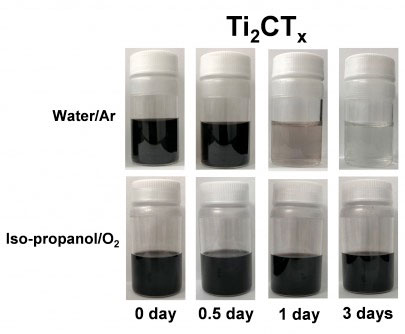| Jan 17, 2019 | |
MXene researchers find 2-D transition-metal carbides react with water, opening a door to their unknown chemistry(Nanowerk News) Researchers at Missouri University of Science and Technology have discovered that 2-D titanium carbide materials, or MXenes, can react with water without the presence of other oxidizers. Their finding may lead to new insights into the unusual chemistry of MXenes and consequently, have impacts on MXenes’ storage and device manufacturing. |
|
| “Our new findings are important because now we know it is water itself rather than oxygen that MXenes need to be protected from during manufacturing and storage,” says Shuohan Huang, a doctoral student in chemisty at Missouri S&T. | |
 |
|
| MXenes’ reactivity toward water is shown in this experiment where a Ti carbide MXene survives longer in an oxygen-saturated, non-aqueous system, in contrast to the same MXene dispersed in argon-saturated water. | |
| MXenes are one of the largest families of 2-D materials. They are a few atom-thick sheets with the structures of transition-metal carbides and nitrides. Their distinctive properties include high electrical conductivity and the ability to disperse in water, a unique combination which earned them a nickname “conductive clays.” | |
| Researchers are excited about the potential use of MXenes in energy storage and harvesting applications such as batteries, supercapacitors and triboelectric nanogenerators, which convert wasted frictional energy into electricity, according to Dr. Vadym Mochalin, associate professor of chemistry at Missouri S&T, who is the principal investigator of this project. | |
| “The reactivity of MXenes toward water we’ve demonstrated not only changes the common perception about resistance of titanium carbide to hydrolysis in ambient conditions, but also points out the striking differences in chemical properties between bulk and 2-D forms of the same material,” says Mochalin. | |
| Mochalin and lead author Huang, who works in Mochalin’s research group at Missouri S&T, discuss their findings in a paper in the American Chemical Society journal Inorganic Chemistry ("Hydrolysis of 2D Transition Metal Carbides (MXenes) in Colloidal Solutions"). | |
| To arrive at their “water-only” conclusion, Huang and Mochalin systematically tested the hydrolysis and chemical stability of MXenes Ti3C2Tx and Ti2CTx in water and non-aqueous colloidal solutions exposed to oxygen and/or inert gas environments in different combinations, as the example shown in the image. | |
| “It seems that in their 2-D state, transition-metal carbides are quite reactive,” says Mochalin. “With our result, we’re looking forward to follow-up studies of their rich chemistry in reactions with water and other molecules, including organic compounds, as well as studies into MXenes’ possible catalytic properties.” |
| Source: Missouri University of Science and Technology | |
|
Subscribe to a free copy of one of our daily Nanowerk Newsletter Email Digests with a compilation of all of the day's news. |
